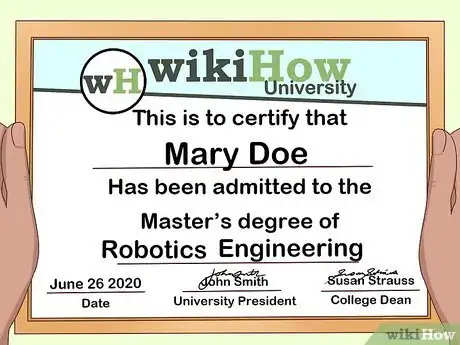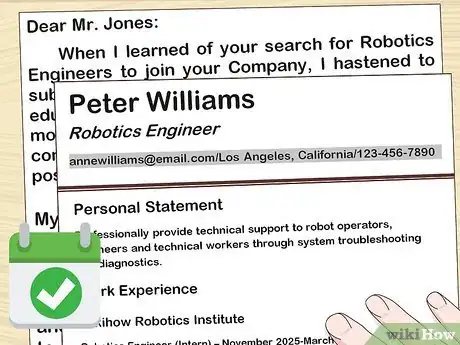This article was co-authored by wikiHow Staff. Our trained team of editors and researchers validate articles for accuracy and comprehensiveness. wikiHow's Content Management Team carefully monitors the work from our editorial staff to ensure that each article is backed by trusted research and meets our high quality standards.
This article has been viewed 33,964 times.
Learn more...
Robotics engineers are responsible for the design, creation, and testing of the robots used in everyday life. This can be an extremely rewarding career but requires years of preparation to do it at a professional level. Don't get discouraged though, as becoming a robotics engineer is obtainable by developing your skills, pursuing a Bachelor’s of Science or Technology, gaining real-world experience, and customizing your job search.
Steps
Developing Your Skills
-
1Take advanced math and science courses in high school. Taking advanced courses in areas such as algebra, trigonometry, and computer science as well as physics will help prepare you for a degree in robotics.[1]
-
2Participate in robotics clubs through your school or community. Engaging in these extracurricular activities will provide you will experience that relates directly to your area of study in college. It will also help college admission offices recognize your interest in this field.[4]
- Extra curricular activities are always useful when it comes to applying for college. Try to find clubs and other organizations that directly relate to the field of study you plan to pursue. It will also help you explore what aspects of robotics interests you the most.[5]
- If you do not have a robotics club at your school, look into joining one at a nearby high school, or better yet, talk to your administration about starting your own robotics club.
Advertisement -
3Enter into robotics competitions to gain experience. This is a great opportunity that will allow you to practice your skills through hands-on experience. It will also help you with college admissions as they see that you are actively engaged in your desired field.[6]
- Schools that participate in robotics clubs may also have their students enter into competitions. However, if your school does have a robotics program, looking at programs such as the VEX Robotics Competition can help you find competitions in your area.
Pursuing Higher Education
-
1Get a Bachelor’s of Science or Technology. When choosing a concentration, look for degree programs in mechanical, electrical or industrial engineering. Mechanical and electrical engineering programs are offered widely throughout colleges and universities. These programs will teach you the fundamentals of engineering in almost any area of interest including, electronic compounds, computing, and pneumatic systems.[7]
- For mechanical engineering, make sure and look for programs that have been approved by the Accreditation Board for Engineering and Technology.[8]
- If your school of choice does not offer robotics as a major, look for a program that allows you to add robotics as your concentration.[9]
- For a list of colleges that provide programs in robotics engineering visit the NASA website at https://robotics.nasa.gov/students/robo_u.php.
-
2Explore all avenues of robotics while in college. Trying your hand in mechanical, electrical, and computer science engineering, will not only help you settle on your area of passion but will give you needed experience in other areas of robotics. Since the world of robotics is ever changing, many are able to get into their careers through different routes.[10]
- Being well-versed in the engineering processes of the brain, nervous system, or body will allow you to enter the field of robotics through alternate avenues, opening up more opportunities when you are searching for a job.[11]
-
3Pursue a Master’s Degree in robotics engineering to make yourself stand out. Although a Master’s Degree is not required for many fields of robotic engineering, this will give you a leg up in the competition. These programs offer a variety of courses that will build your skills in mechanical, electrical or computer engineering.[12]
- Be aware that many graduate programs in robotics will require you to complete a capstone or detailed research project.[13]
Gaining Experience
-
1Get an internship to explore your field and network within the industry. Participating in internships is key to getting your desired position. Not only will it provide you with hands-on experiences but also, it will allow you to get to know others in your field while connecting with those who may be able to help you get a job in the future.[14]
- To successfully find an internship, talk to your school’s advisors. You can also join online forums created by start-up companies. This is an easy way to post your qualifications online and connect with a company that is a great fit for your interests.[15]
- There are also government organizations that you can connect with to find the best internship. You will have to go directly through these sites to upload your information and documents on their careers or job opportunities pages.[16]
-
2Get hands-on experience through training programs. This is a great option if, for some reason, you are unable to find an internship. There are many reputable institutions that offer training programs during summer and winter breaks to help budding engineers have hands-on practice.[17]
- These institutions will also allow to choose a program that interests you the most or directly relates to your field. This way you know you are getting the experience, not only required by your field but in your area of interest.[18]
- You can also improve your skills by finding online building project courses or building your own project by using the latest technology. This will help you build your portfolio by adding new skills and getting hands-on application practice.[19]
-
3Find a mentor that works in the industry. Since there are many specific areas of robotics that you can enter, it is important to first identify what your ideal career path will be. Having a clear goal for yourself will help you choose the best mentor to help you reach your overall goal.[20]
- Try to find a mentor that is currently in or has recently worked in your chosen area. Many companies can link you with mentors through their Human Resources department.[21]
- If a mentor through Human Resources is not an option for you, reach out to others in your field whom you have networked with, and ask for referrals and suggestions of mentors they have used. Also, try asking fellow engineers in your field if they would be interested in mentoring you.[22]
- If you are unable to find a mentor through any of these sources, turn to the Internet. There are many sights such as LinkedIn, that you can use to connect with mentors and others in your field. [23]
Finding a Job
-
1Keep your resume and cover letter up-to-date. Your resume should include any information that will boost your standing in the application process. Use your cover letter to explain to the company you are applying to, how your skills and experience will benefit them, and what you will bring to the table.[24]
- Make sure to include your education, credentials, particular skills you possess that will benefit their company, and any hands-on experience including building projects.[25]
- Always include key skills found in the employer's job posting in your resume and cover letter. Look for ways to incorporate their objectives and goals in order to be moved to the top of the applicant pile.[26]
-
2Look for a job near you. One of the best resources to help you get started with your job search is the Robotic Industries Association.[27] This and other sites like it, will connect you with a wide variety of employers, making your job search a little easier and more condensed.
- Although it may take a little time, going through websites like these, is a great way to find out what employers are looking for in their candidates and what the skills are that they value the most.
-
3Prepare for your interview ahead of time. Make sure and prepare answers to sell your skills to the interviewers. Take everything you have learned and practiced and relate it, specifically to this employers objective for their company.[28]
- Remember that these will often times be more technical interviews. The interviewer is not only trying to get an idea for your skills but also, to identify your specialty.[29]
Community Q&A
-
QuestionWhat should a 13-year-old do in order to prepare?
 Aditya GwalaCommunity AnswerStart learning programming languages and research robotics. You can also join a robotics club in your school (if it has one).
Aditya GwalaCommunity AnswerStart learning programming languages and research robotics. You can also join a robotics club in your school (if it has one). -
QuestionWhy is the salary of robotics engineers so low?
 Aditya GwalaCommunity AnswerThis because it is a new field. However, this field will grow exponentially in the coming decade. Although, arguably, some companies are already offering high salaries even now.
Aditya GwalaCommunity AnswerThis because it is a new field. However, this field will grow exponentially in the coming decade. Although, arguably, some companies are already offering high salaries even now.
References
- ↑ https://learn.org/articles/Robotics_Engineering_Become_a_Robotics_Engineer_in_5_Steps.html
- ↑ http://www.machinedesign.com/motion-control/whys-and-hows-becoming-robotics-engineer
- ↑ https://www.machinedesign.com/motion-control/whys-and-hows-becoming-robotics-engineer
- ↑ https://learn.org/articles/Robotics_Engineering_Become_a_Robotics_Engineer_in_5_Steps.html
- ↑ https://www.machinedesign.com/motion-control/whys-and-hows-becoming-robotics-engineer
- ↑ https://learn.org/articles/Robotics_Engineering_Become_a_Robotics_Engineer_in_5_Steps.html
- ↑ https://learn.org/articles/Robotics_Engineering_Become_a_Robotics_Engineer_in_5_Steps.html
- ↑ https://learn.org/articles/Robotics_Engineering_Become_a_Robotics_Engineer_in_5_Steps.html
- ↑ https://learn.org/articles/Robotics_Engineering_Become_a_Robotics_Engineer_in_5_Steps.html
- ↑ http://www.machinedesign.com/motion-control/whys-and-hows-becoming-robotics-engineer
- ↑ http://www.machinedesign.com/motion-control/whys-and-hows-becoming-robotics-engineer
- ↑ https://learn.org/articles/Robotics_Engineering_Become_a_Robotics_Engineer_in_5_Steps.html
- ↑ https://learn.org/articles/Robotics_Engineering_Become_a_Robotics_Engineer_in_5_Steps.html
- ↑ https://learn.org/articles/Robotics_Engineering_Become_a_Robotics_Engineer_in_5_Steps.html
- ↑ http://www.skyfilabs.com/blog/good-internship-ideas-for-electronics-and-communication-engineering-students
- ↑ http://www.skyfilabs.com/blog/good-internship-ideas-for-electronics-and-communication-engineering-students
- ↑ http://www.skyfilabs.com/blog/good-internship-ideas-for-electronics-and-communication-engineering-students
- ↑ http://www.skyfilabs.com/blog/good-internship-ideas-for-electronics-and-communication-engineering-students
- ↑ http://www.skyfilabs.com/blog/good-internship-ideas-for-electronics-and-communication-engineering-students
- ↑ https://www.engineering.com/JobArticles/ArticleID/2197/Finding-a-Mentor-Who-is-a-Good-Match-for-You.aspx
- ↑ https://www.engineering.com/JobArticles/ArticleID/2197/Finding-a-Mentor-Who-is-a-Good-Match-for-You.aspx
- ↑ https://www.engineering.com/JobArticles/ArticleID/2197/Finding-a-Mentor-Who-is-a-Good-Match-for-You.aspx
- ↑ https://www.engineering.com/JobArticles/ArticleID/2197/Finding-a-Mentor-Who-is-a-Good-Match-for-You.aspx
- ↑ http://www.skyfilabs.com/blog/good-internship-ideas-for-electronics-and-communication-engineering-students
- ↑ http://www.skyfilabs.com/blog/good-internship-ideas-for-electronics-and-communication-engineering-students
- ↑ http://www.skyfilabs.com/blog/good-internship-ideas-for-electronics-and-communication-engineering-students
- ↑ https://www.machinedesign.com/motion-control/whys-and-hows-becoming-robotics-engineer
- ↑ https://careertrend.com/prepare-engineer-interview-8885.html
- ↑ https://careertrend.com/prepare-engineer-interview-8885.html









































































